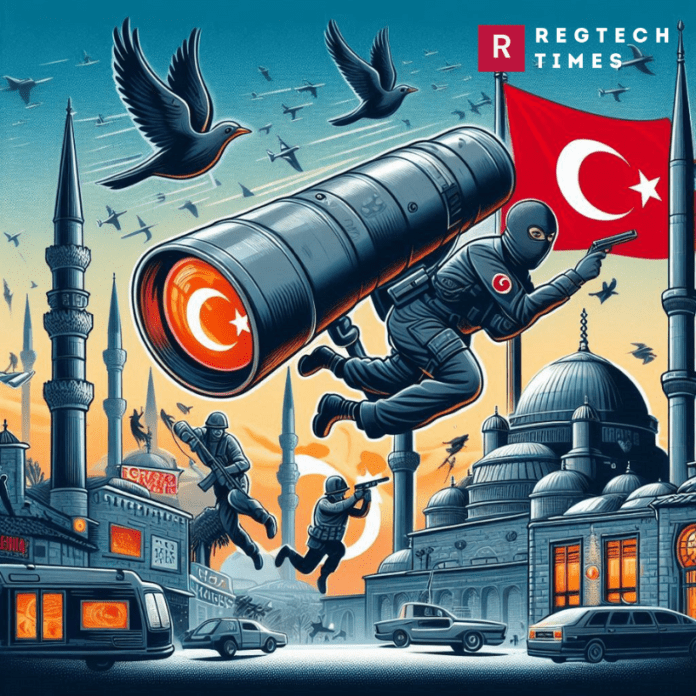In the shadowy world of international espionage, a high-stakes drama is unfolding in Istanbul, where a Turkish prosecutor is seeking to imprison 57 suspects, each facing up to 20 years for allegedly spying for the Israeli intelligence agency, Mossad. This trial, held at the 28th Heavy Penal Court, has revealed a complex network of covert operations and clandestine tactics aimed at obtaining confidential state information.
Turkish Prosecutor’s Accusations
Turkish prosecutor’s indictment paints a detailed picture of an elaborate espionage operation orchestrated by Mossad. According to the charges, the Israeli intelligence agency utilized a remote, online team to manage sources, transfer funds via live couriers, and execute tactical operations against its targets within Türkiye. The indictment accuses the defendants of “obtaining confidential state information for political or military espionage,” a charge that underscores the severity of the allegations of Turkish Prosecutor.
The Mossad’s operational strategy, as outlined in the indictment, involved initial contact with the suspects through encrypted messaging applications such as Telegram and WhatsApp. Notably, no video or voice calls were made to maintain the utmost secrecy. Payments for their espionage services were executed through various channels, including international money transfer companies, cryptocurrencies, and direct courier transfers.
The Spies and Their Roles
The defendants, a mix of detectives and seemingly ordinary individuals, were given specific roles tailored to their backgrounds. Detectives handled tasks requiring professional expertise, while others, using aliases like “Abdalla Qassem” and “Roman Romanov,” were assigned more tactical jobs that required discretion and subtlety. These tasks included managing WhatsApp chat groups, running a news website, conducting surveillance, and even engaging in physical assaults and robberies targeting individuals in Syria and Lebanon.
Espionage: Unveiling the Covert World of Spies, Secrets, and Betrayal
Mossad’s directives to these operatives were clear and methodical. The detectives were responsible for gathering detailed intelligence, such as biographical data, conducting live surveillance, placing tracking devices, and engaging in cyber activities. The tactical team, on the other hand, focused on money transfers, documentation, and various forms of surveillance and direct action against targets.
Exploiting System Gaps
Turkish Prosecutor alleged that the suspects exploited gaps within Türkiye’s security apparatus, leveraging connections within critical state institutions to access confidential information. “It’s the kind of information that should remain secret due to its nature,” the prosecution argued, underscoring the sensitive and potentially damaging nature of the intelligence obtained.
The call for 15 to 20 years in prison for each suspect reflects the gravity of the charges. However, the Istanbul court has shown some leniency, releasing 18 defendants on probation due to the time they have already served and the perceived low risk of them tampering with evidence. Additionally, the court lifted international travel bans on 36 other defendants, though the trial continues with the defense preparing to counter the prosecution’s arguments.
Aliia Roza Unveils the Intriguing World of Sexpionage and Betrayal
The Broader Context
This espionage trial is set against a backdrop of ongoing tensions between Türkiye and Israel, particularly in light of the Palestinian-Israeli conflict. Türkiye has been vigilant in uncovering and dismantling Mossad networks operating within its borders. Since January, authorities have detained or arrested numerous individuals suspected of spying for Mossad, with six people charged as recently as March. These operations primarily targeted individuals associated with Hamas and other Palestinian resistance groups.
Secrets of a Spy: Brittany Butler Jenning’s Covert Love Life Behind the Badge
Mossad’s recruitment efforts extended beyond Turkish nationals, involving Palestinians and Syrian nationals living in Türkiye. These operatives were allegedly tasked with spying on Palestinians, including those linked to Hamas, and conducting various forms of intelligence gathering against foreigners in Türkiye.
Diplomatic Strains
The trial and its revelations have further strained the already fragile relations between Türkiye and Israel. Despite a brief thaw in diplomatic relations last year, tensions flared up again following the outbreak of renewed violence between Israel and Palestinian groups in October. Türkiye, a vocal critic of Israel’s military actions in Gaza, has maintained a firm stance against Israeli aggression, with President Recep Tayyip Erdoğan warning of “serious consequences” should Israel attack Hamas officials on Turkish soil.
Turkish Ship Owner Plead Guilty to Environmental Crimes, Fined $2 Million in New Orleans
The head of Israel’s Shin Bet security agency has also contributed to the tensions, publicly stating in December that his organization is prepared to target Hamas anywhere, including in Lebanon, Türkiye, and Qatar. This rhetoric, coupled with the espionage trial, highlights the ongoing geopolitical struggle and the complex interplay of intelligence operations that continue to shape the region’s landscape.
As the trial progresses, the world watches the Turkish Prosecutor’s allegations closely. The outcome will not only determine the fate of the 57 defendants but also impact the broader dynamics of Turkish-Israeli relations. For now, the intricate web of espionage, secrecy, and international intrigue continues to unravel, revealing the high stakes and the relentless pursuit of strategic advantage in a deeply divided region.


